- Home
- W. Somerset Maugham
Cakes and Ale Page 9
Cakes and Ale Read online
Page 9
I was taken aback at this. After all, the Driffields lived in a house that they were talking of buying and they had a ‘general’. It wouldn’t be at all the thing for them to have Mary-Ann to tea, and it would make it very awkward for me. They seemed to have no sense of the things one could do, and the things one simply couldn’t. It never ceased to embarrass me, the way in which they talked of incidents in their past that I should have thought they would not dream of mentioning. I do not know that the people I lived among were pretentious in the sense of making themselves out to be richer or grander than they really were, but looking back it does seem to me that they lived a life full of pretences. They dwelt behind a mask of respectability. You never caught them in their shirtsleeves with their feet on the table. The ladies put on afternoon dresses, and were not visible till then; they lived privately with rigid economy so that you could not drop in for a casual meal, but when they entertained their tables groaned with food.
Though catastrophe overwhelmed the family they held their heads high and ignored it. One of the sons might have married an actress, but they never referred to the calamity, and though the neighbours said it was dreadful, they took ostentatious care not to mention the theatre in the presence of the afflicted. We all knew that the wife of Major Greencourt who had taken the Three Gables was connected with trade, but neither she nor the major ever so much as hinted at the discreditable secret; and though we sniffed at them behind their backs, we were too polite even to mention crockery (the source of Mrs Greencourt’s adequate income) in their presence. It was still not unheard of for an angry parent to cut off his son with a shilling, or to tell his daughter (who like my own mother had married a solicitor) never to darken his doors again. I was used to all this, and it seemed to me natural. What did shock me was to hear Ted Driffield speak of being a waiter in a restaurant in Holborn as though it were the most ordinary thing in the world. I knew he had run away to sea: that was romantic; I knew that boys, in books at all events, often did this and had thrilling adventures before they married a fortune and an earl’s daughter; but Ted Driffield had driven a cab at Maidstone and had been clerk in a booking-office at Birmingham. Once when we bicycled past the Railway Arms, Mrs Driffield mentioned quite casually, as though it were something that anyone might have done, that she had worked there for three years.
‘It was my first place,’ she said. ‘After that I went to the Feathers at Haversham. I only left there to get married.’
She laughed as though she enjoyed the recollection. I did not know what to say; I did not know which way to look; I blushed scarlet. Another time when we were going through Ferne Bay on our way back from a long excursion, it being a hot day, and all of us thirsty, she suggested that we should go into the Dolphin and have a glass of beer. She began talking to the girl behind the bar, and I was horrified to hear her remark that she had been in the business herself for five years. The landlord joined us, and Ted Driffield offered him a drink, and Mrs Driffield said that the barmaid must have a glass of port, and for some time they all chatted amiably about trade and tied houses, and how the price of everything was going up. Meanwhile, I stood, hot and cold all over, and not knowing what to do with myself. As we went out Mrs Driffield remarked:
‘I took quite a fancy to that girl, Ted. She ought to do well for herself. As I said to her, it’s a hard life but a merry one. You do see a bit of what’s going on and if you play your cards right you ought to marry well. I noticed she had an engagement ring on, but she told me she just wore that because it gave the fellows a chance to tease her.’
Driffield laughed. She turned to me.
‘I had a rare old time when I was a barmaid, but of course you can’t go on for ever. You have to think of your future.’
But a greater jolt awaited me. It was half-way through September and my holidays were drawing to an end. I was very full of the Driffields, but my desire to talk about them at home was snubbed by my uncle.
‘We don’t want your friends pushed down our throats all day long,’ said he. ‘There are other topics of conversation that are more suitable. But I do think that, as Ted Driffield was born in the Parish and is seeing you almost every day, he might come to church occasionally.’
One day I told Driffield: ‘My uncle wants you to come to church.’
‘All right. Let’s go to church next Sunday night, Rosie.’
‘I don’t mind,’ she said.
I told Mary-Ann they were going. I sat in the vicarage pew just behind the squire’s and I could not look round, but I was conscious by the behaviour of my neighbours on the other side of the aisle that they were there, and as soon as I had a chance next day I asked Mary-Ann if she had seen them.
‘I see ’er all right,’ said Mary-Ann grimly.
‘Did you speak to her afterwards?’
‘Me?’ She suddenly burst into anger. ‘You get out of my kitchen. What d’you want to come bothering me all day long? How d’you expect me to do my work with you getting in my way all the time?’
‘All right,’ I said. ‘Don’t get in a wax.’
‘I don’t know what your uncle’s about lettin’ you go all over the place with the likes of them. All them flowers in her ‘at. I wonder she ain’t ashamed to show her face. Now run along, I’m busy.’
I did not know why Mary-Ann was so cross. I did not mention Mrs Driffield again. But two or three days later I happened to go into the kitchen to get something I wanted. There were two kitchens at the vicarage, a small one in which the cooking was done and a large one, built, I suppose, for a time when country clergymen had large families and gave grand dinners to the surrounding gentry, where Mary-Ann sat and sewed when her day’s work was over. We had cold supper at eight so that after tea she had little to do. It was getting on for seven and the day was drawing in. It was Emily’s evening out and I expected to find Mary-Ann alone, but as I went along the passage I heard voices and the sound of laughter. I supposed Mary-Ann had someone in to see her. The lamp was lit, but it had a thick green shade and the kitchen was almost in darkness. I saw a teapot and cups on the table. Mary-Ann was having a late cup of tea with her friend. The conversation stopped as I opened the door, then I heard a voice:
‘Good evening.’
With a start I saw that Mary-Ann’s friend was Mrs Driffield. Mary-Ann laughed a little at my surprise.
‘Rosie Gann dropped in to have a cup of tea with me,’ she said. ‘We’ve been having a talk about old times.’
Mary-Ann was a little shy at my finding her thus, but not half so shy as I. Mrs Driffield gave me that childlike, mischievous smile of hers; she was perfectly at her ease. For some reason I noticed her dress, I suppose because I had never seen her so grand before. It was of pale blue cloth, very tight at the waist, with high sleeves and a long skirt with a flounce at the bottom. She wore a large, black, straw hat with a great quantity of roses and leaves and bows on it. It was evidently the hat she had worn in church on Sunday.
‘I thought if I went on waiting till Mary-Ann came to see me I’d have to wait till Doomsday, so I thought the best thing I could do was to come and see her myself.’
Mary-Ann grinned self-consciously, but did not look displeased. I asked for whatever it was I wanted and, as quickly as I could, left them. I went out into the garden and wandered about aimlessly. I walked down to the road and looked over the gate. The night had fallen. Presently I saw a man strolling along. I paid no attention to him, but he passed backward and forward and it looked as though he were waiting for someone. At first I thought it might be Ted Driffield and I was on the point of going out when he stopped and lit a pipe; I saw it was Lord George. I wondered what he was doing there and at the same moment it struck me that he was waiting for Mrs Driffield. My heart began to beat fast, and though I was hidden by the darkness I withdrew into the shade of the bushes. I waited a few minutes longer, then I saw the side door open and Mrs Driffield let out by Mary-Ann. I heard her footsteps on the gravel. She came to the gate and opened it. It ope
ned with a little click. At the sound Lord George stepped across the road and before she could come out slipped in. He took her in his arms and gave her a great hug. She gave a little laugh.
‘Take care of my hat,’ she whispered.
I was not more than three feet away from them and I was terrified lest they should notice me. I was so ashamed for them. I was trembling with agitation. For a minute he held her in his arms.
‘What about the garden?’ he said, still in a whisper.
‘No; there’s that boy. Let’s go in the fields.’
They went out by the gate, he with his arm round her waist, and were lost in the night. Now I felt my heart pounding against my chest so that I could hardly breathe. I was so astonished at what I had seen that I could not think sensibly. I would have given anything to be able to tell someone, but it was a secret and I must keep it. I was thrilled with the importance it gave me. I walked slowly up to the house and let myself in by the side door. Mary-Ann, hearing it open, called me.
Is that you, Master Willie?’
‘Yes.’
I looked in the kitchen. Mary-Ann was putting the supper on a tray to take it into the dining-room.
‘I wouldn’t say anything to your uncle about Rosie Gann ‘avin’ been here,’ she said.
‘Oh, no.’
‘It was a surprisement to me. When I ’eard a knock at the side door and opened it and saw Rosie standing there, you could ’ave knocked me down with a feather. “Mary-Ann,” she says, an’ before I knew what she was up to she was kissing me all over me face. I couldn’t but ask ’er in and when she was in I couldn’t but ask her to ’ave a nice cup of tea.’
Mary-Ann was anxious to excuse herself. After all she had said of Mrs Driffield it must seem strange to me that I should find them sitting there together chatting away and laughing. I did not want to crow.
‘She’s not so bad, is she?’ I said.
Mary-Ann smiled. Notwithstanding her black decayed teeth her smile was sweet and touching.
‘I don’t ’ardly know what it is, but there’s somethin’ you can’t ’elp likin’ about her. She was ’ere the best part of an hour and I will say that for ’er, she never once give ’erself airs. And she told me with ’er own lips the material of that dress she ’ad on cost thirteen and eleven a yard and I believe it. She remembers everything, how I used to brush her ’air for her when she was a tiny tot and how I used to make her wash her little ’ands before tea. You see, sometimes her mother used to send ’er in to ’ave her tea with us. She was as pretty as a picture in them days.’
Mary-Ann looked back into the past and her funny crumpled face grew wistful.
‘Oh, well,’ she said after a pause, ‘I dare say she’s been no worse than plenty others if the truth was only known. She ’ad more temptation than most, and I dare say a lot of them as blame her would ’ave been no better than what she was if they’d ’ad the opportunity.’
8
The weather broke suddenly; it grew chilly, and heavy rain fell. It put an end to our excursions. I was not sorry, for I did not know how I could look Mrs Driffield in the face now that I had seen her meeting with George Kemp. I was not so much shocked as astonished. I could not understand how it was possible for her to like being kissed by an old man, and the fantastic notion passed through my mind, filled with the novels I had read, that somehow Lord George held her in his power and forced her by his knowledge of some fearful secret to submit, to his loathsome embraces. My imagination played with terrible possibilities. Bigamy, murder, and forgery. Very few villains in books failed to hold the threat of exposure of one of these crimes over some hapless female. Perhaps Mrs Driffield had backed a bill; I never could quite understand what this meant, but I knew that the consequences were disastrous. I toyed with the fancy of her anguish (the long sleepless nights when she sat at her window in her nightdress, her fair hair hanging to her knees, and watched hopelessly for the dawn) and saw myself (not a boy of fifteen with sixpence a week pocket-money, but a tall man with a waxed moustache and muscles of steel, in faultless evening dress) with a happy blend of heroism and dexterity rescuing her from the toils of the rascally blackmailer. On the other hand, it had not looked as though she had yielded quite unwillingly to Lord George’s fondling and I could not get out of my ears the sound of her laugh. It had a note that I had never heard before. It gave me a queer feeling of breathlessness.
During the rest of my holidays I only saw the Driffields once more. I met them by chance in the town and they stopped and spoke to me. I suddenly felt very shy again, and when I looked at Mrs Driffield I could not help blushing with embarrassment, for there was nothing in her countenance that indicated a guilty secret. She looked at me with those soft blue eyes of hers in which there was a child’s playful naughtiness. She often held her mouth a little open, as though it were just going to break into a smile, and her lips were full and red. There was honesty and innocence in her face and an ingenuous frankness, and though then I could not have expressed this, I felt it quite strongly. If I had put it into words at all I think I should have said: she looks as straight as a die. It was impossible that she could be ‘carrying on’ with Lord George. There must be an explanation; I did not believe what my eyes had seen.
Then the day came when I had to go back to school. The carter had taken my trunk and I walked to the station by myself. I had refused to let my aunt see me off, thinking it more manly to go alone, but I felt rather low as I walked down the street. It was a small branch line to Tercanbury and the station was at the other end of the town near the beach. I took my ticket and settled myself in the corner of a third-class carriage. Suddenly I heard a voice: ‘There he is’; and Mr and Mrs Driffield bustled gaily up.
‘We thought we must come and see you off,’ she said. ‘Are you feeling miserable?’
‘No, of course not.’
‘Oh, well, it won’t last long. We’ll have no end of a time when you come back for Christmas. Can you skate?’
‘No.’
‘I can. I’ll teach you.’
Her high spirits cheered me, and at the same time the thought that they had come to the station to say good-bye to me gave me a lump in my throat. I tried hard not to let the emotion I felt appear on my face.
‘I expect I shall be playing a lot of rugger this term,’ I said. ‘I ought to get into the second fifteen.’
She looked at me with kindly shining eyes, smiling with her full red lips. There was something in her smile I had always rather liked, and her voice seemed almost to tremble with a laugh or a tear. For one horrible moment I was afraid that she was going to kiss me. I was scared out of my wits. She talked on, she was mildly facetious as grown-up people are with schoolboys, and Driffield stood there without saying anything. He looked at me with a smile in his eyes and pulled his beard. Then the guard blew a cracked whistle and waved a flag. Mrs Driffield took my hand and shook it. Driffield came forward.
‘Good-bye,’ he said. ‘Here’s something for you.’
He pressed a tiny packet into my hand and the train steamed off. When I opened it I found two half-crowns wrapped in a piece of toilet-paper. I blushed to the roots of my hair. I was glad enough to have an extra five shillings, but the thought that Ted Driffield had dared to give me a tip filled me with rage and humiliation. I could not possibly accept anything from him. It was true that I had bicycled with him and sailed with him, but he wasn’t a sahib (I had got that from Major Greencourt) and it was an insult to give me five shillings. At first I thought of returning the money without a word, showing by my silence how outraged I was at the solecism he had committed, then I composed in my head a dignified and frigid letter, in which I thanked him for his generosity, but said that he must see how impossible it was for a gentleman to accept a tip from someone who was practically a stranger. I thought it over for two or three days, and every day it seemed more difficult to part with the two half-crowns. I felt sure that Driffield had meant it kindly, and of course he was very bad form, and
didn’t know about things; it would be rather hard to hurt his feelings by sending the money back, and finally I spent it. But I assuaged my wounded pride by not writing to thank Driffield for his gift.
When Christmas came, however, and I went back to Blackstable for the holidays, it was the Drifflelds I was most eager to see. In that stagnant little place they alone seemed to have a connexion with the outside world which already was beginning to touch my daydreams with anxious curiosity. But I could not overcome my shyness enough to go to their house and call, and I hoped that I should meet them in the town. But the weather was dreadful, a boisterous wind whistled down the street, piercing you to the bone, and the few who had an errand were swept along by their full skirts like fishing boats in half a gale. The cold rain scudded in sudden squalls, and the sky, which in summer had enclosed the friendly country so snugly, now was a great pall that pressed upon the earth with awful menace. There was small hope of meeting the Driffields by chance, and at last I took my courage in both hands and one day after tea slipped out. As far as the station the road was pitch dark, but there the street lamps, few and dim, made it easier to keep to the pavement. The Driffields lived in a little two-storey house in a side street; it was of dingy yellow brick, and had a bow window. I knocked, and presently a little maid opened the door; I asked if Mrs Driffield was in. She gave me an uncertain look, and, saying she would go and see, left me standing in the passage. I had already heard voices in the next room, but they were stilled as she opened the door and, entering, shut it behind her. I had a faint impression of mystery; in the houses of my uncle’s friends, even if there was no fire and the gas had to be lit as you went you were shown into the drawing-room when you called. But the door was opened and Driffield came out. There was only a speck of light in the passage, and at first he could not see who it was; but in an instant he recognized me.

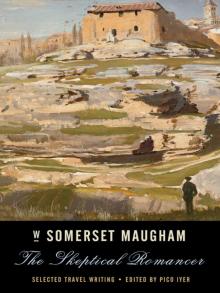 The Skeptical Romancer: Selected Travel Writing
The Skeptical Romancer: Selected Travel Writing The Summing Up
The Summing Up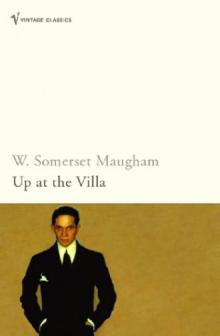 Up at the Villa
Up at the Villa The Razor's Edge
The Razor's Edge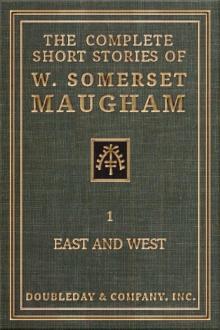 The Complete Short Stories of W. Somerset Maugham: East and West (Vol. 1 of 2))
The Complete Short Stories of W. Somerset Maugham: East and West (Vol. 1 of 2))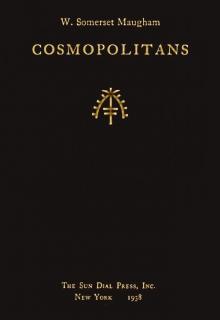 Cosmopolitans
Cosmopolitans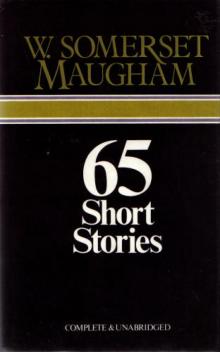 65 Short Stories
65 Short Stories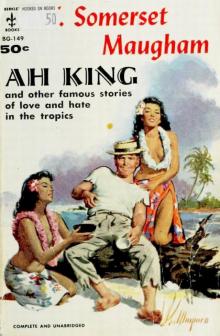 Ah King (Works of W. Somerset Maugham)
Ah King (Works of W. Somerset Maugham)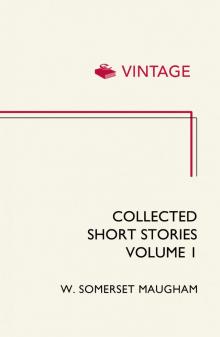 Collected Short Stories: Volume 1
Collected Short Stories: Volume 1 Collected Short Stories Volume 2
Collected Short Stories Volume 2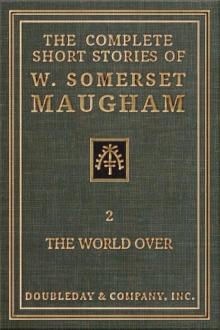 The Complete Short Stories of W. Somerset Maugham - II - The World Over
The Complete Short Stories of W. Somerset Maugham - II - The World Over Collected Short Stories Volume 4
Collected Short Stories Volume 4 Theatre
Theatre Short Stories
Short Stories Then and Now
Then and Now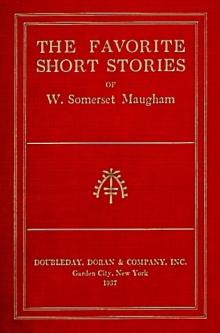 The Favorite Short Stories of W. Somerset Maugham
The Favorite Short Stories of W. Somerset Maugham Of Human Bondage
Of Human Bondage The Magician
The Magician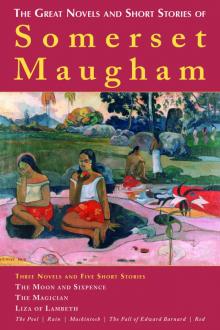 The Great Exotic Novels and Short Stories of Somerset Maugham
The Great Exotic Novels and Short Stories of Somerset Maugham A Writer's Notebook
A Writer's Notebook Christmas Holiday
Christmas Holiday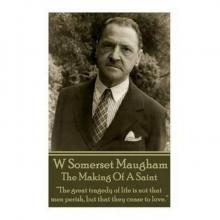 The Making of a Saint
The Making of a Saint Merry Go Round
Merry Go Round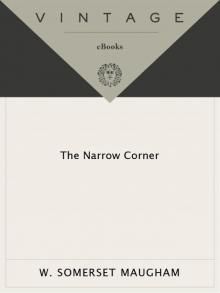 The Narrow Corner
The Narrow Corner Collected Short Stories Volume 3
Collected Short Stories Volume 3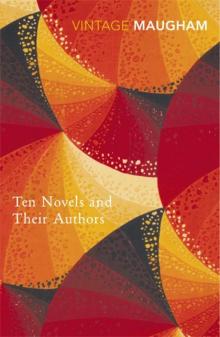 Ten Novels and Their Authors
Ten Novels and Their Authors Ashenden
Ashenden The Moon and Sixpence
The Moon and Sixpence Cakes and Ale
Cakes and Ale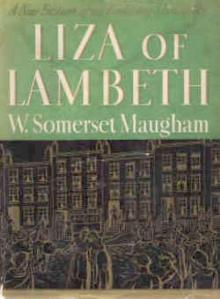 Liza of Lambeth
Liza of Lambeth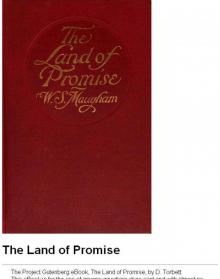 The Land of Promise: A Comedy in Four Acts (1922)
The Land of Promise: A Comedy in Four Acts (1922) A Writer's Notebook (Vintage International)
A Writer's Notebook (Vintage International)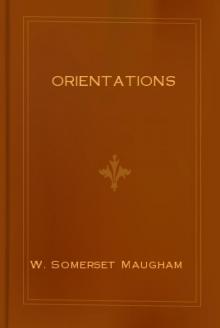 Orientations
Orientations Selected Masterpieces
Selected Masterpieces Mrs Craddock
Mrs Craddock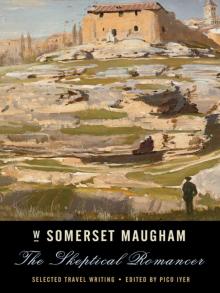 The Skeptical Romancer
The Skeptical Romancer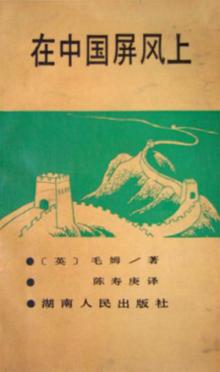 On a Chinese Screen
On a Chinese Screen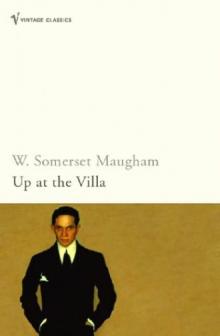 (1941) Up at the Villa
(1941) Up at the Villa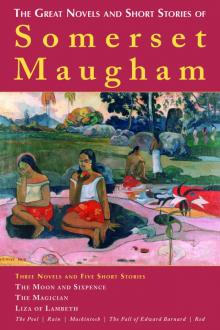 The Great Novels and Short Stories of Somerset Maugham
The Great Novels and Short Stories of Somerset Maugham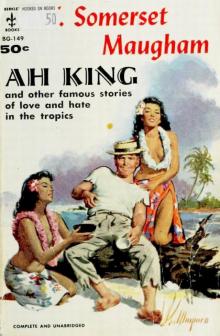 Ah King
Ah King The Explorer
The Explorer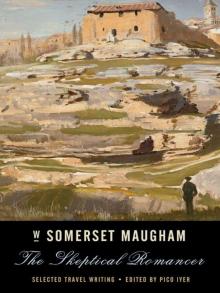 The Skeptical Romancer: Selected Travel Writing (Vintage Departures)
The Skeptical Romancer: Selected Travel Writing (Vintage Departures)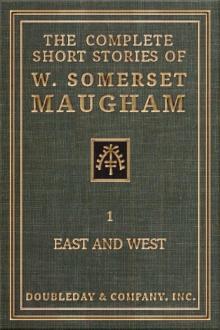 The Complete Short Stories of W. Somerset Maugham - I - East and West
The Complete Short Stories of W. Somerset Maugham - I - East and West